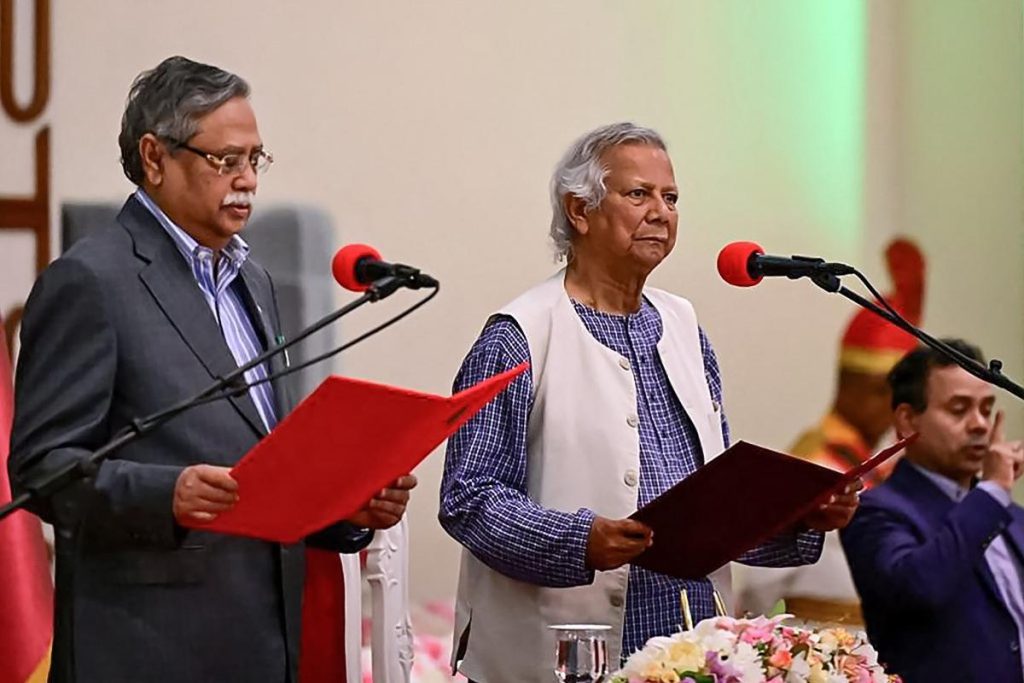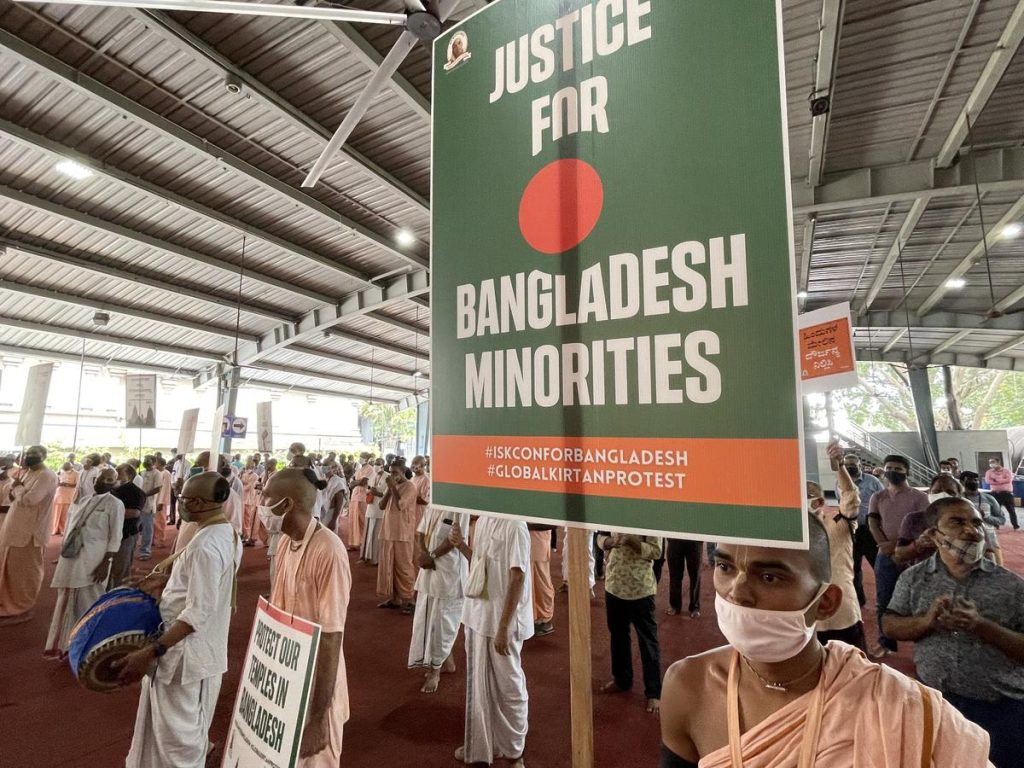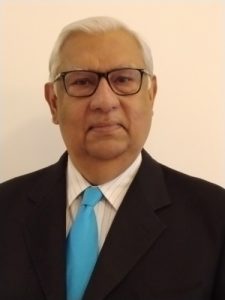By Pinak Ranjan Chakravarty
Prime Minister Sheikh Hasina’s dramatic flight to seek refuge in India left a political vacuum. It plunged Bangladesh into a downward spiral of chaos that the country’s interim government is struggling to manage. Contrary to the Army Chief’s public announcement of Sheikh Hasina’s resignation and flight to India, she did not submit any resignation letter to the President. In power for an unbroken period of 15 years, Hasina provided stability and economic growth to Bangladesh. She also became progressively authoritarian and cracked down on dissent, albeit with nationalistic intentions.
After her sudden departure, bilateral ties with India have plummeted, as anti-India political forces have captured power. These forces have taken policy decisions that clearly signal a desire to provoke and confront India. They have also launched violent attacks, especially targeting Awami League [AL] members and minorities – Hindus, Buddhists and Christians.
Despite the Supreme Court’s judgement to drastically cut back on government job quotas and the agitation dying down temporarily, it suddenly reignited. Recent statements by Islamist student leaders confirm that the decision to exploit the agitation for regime change was a well-planned strategy, a fact confirmed by Prof Muhammad Yunus, Nobel Laureate for Peace who was catapulted into the position of Chief Adviser (CA) of the temporary interim government (IG).
Islamist student cadres received guidance and training from organizations linked with the American “deep state” with possible assistance from agent provocateurs, possibly retired military mercenaries. The trump card was played by the Bangladesh army which decided to collaborate in the regime change operation, most probably under pressure from the US. The Islamist network was energized by Pakistan’s intelligence agencies.
Geopolitical Intrigue & the American Hand
The Hasina government’s ties with the US were correct but not warm. She, more or less, froze ties with Pakistan. The Biden Administration ramped up pressure on Hasina’s government by imposing visa sanctions on the American-trained Rapid Action Battalion (RAB), the counter-terrorist organization which played a major role in eliminating Islamic radicals involved in several terrorist attacks. The Biden Administration used this leverage to mount pressure for signing military cooperation agreements and establishing military facilities on St. Martin’s Island, not far from Myanmar’s coast.
In an interview, Hasina had claimed that a “white man” had suggested that if she agreed to a military facility on St. Martin’s island, she need not worry about being “disturbed.” Hasina’s innate nationalistic sentiments led her to reject these overtures. American-promoted regime change operations in various countries have always led to chaos and instability. The American philosopher George Santayana had presciently said that “those who cannot remember the past are condemned to repeat it.”
Yunus praised one student leader for the “meticulous” planning of the agitation to overthrow Hasina. This student, having close ties to the Hizb-ut-Tahrir, a banned terrorist organization, is now an adviser in the IG. He recently tweeted a map of a greater Bangladesh that included India’s north-eastern states and half of West Bengal. India was forced to protest, and the post was deleted. The IG later disowned the tweet claiming it was his personal view. All other advisers in the IG are either pro-BNP or pro-Islamist and all are anti-AL.
Soon after Yunus was planted as the CA, the State Department and a Pentagon delegation arrived in Dhaka, followed by a delegation from the International Republican Institute (IRI), an NGO known for the “promotion of democracy” worldwide in collaboration with several international organizations. It collaborates with the CIA in such efforts. The vice-president of the George Soros Foundation also visited Dhaka to meet Yunus who has had long-standing ties with Soros. These visits confirmed the “American hand” in ousting Hasina from power. Yunus has provided an acceptable face to an unconstitutional government. He has powerful American patrons and close ties with former American Presidents Bill Clinton and Barack Obama and the Democratic Party. The US sent a clear signal that the outgoing Biden Administration was itching to let India know that opposing American demands to align against Russia had consequences.
Yunus’ Political Ambition
 Yunus made his first foray into politics in 2007, following his receipt of the Nobel Prize, but it failed despite backing from the Bangladesh army and his American patrons. He launched a political party called Nagorik Shakti (Citizens’ Power). Yunus was promoted as a potential national leader to contest elections, alongside other new parties, as part of the “minus two” formula aimed at exiling the two “warring begums,” Sheikh Hasina and Khaleda Zia.
Yunus made his first foray into politics in 2007, following his receipt of the Nobel Prize, but it failed despite backing from the Bangladesh army and his American patrons. He launched a political party called Nagorik Shakti (Citizens’ Power). Yunus was promoted as a potential national leader to contest elections, alongside other new parties, as part of the “minus two” formula aimed at exiling the two “warring begums,” Sheikh Hasina and Khaleda Zia.
Yunus’ political ambition reinforced Hasina’s view about American intentions that go back to 1971 when the US had backed Pakistan and the Jamaat-e-Islami (JeI). When her father PM Sheikh Mujibur Rahman and his family were assassinated in a military coup in 1975, she suspected that it was an American-Pakistani conspiracy. When Hasina became PM in 2009, several cases against Yunus were filed for money laundering and embezzlement. Hasina came under relentless pressure from former American Presidents Clinton and Obama to withdraw the cases. Hasina publicly rebuked Yunus by calling him a shudkhor (a person who takes high interest on loans). Since then, Yunus has harboured a deep animosity against Hasina. He often refers to her as a “fallen dictator” or a “fascist.”
Post-Hasina Mayhem
 Retributive violence has become normalized under the Yunus-led IG. Violent reprisals by BNP party members and Islamist militants have swept across the country, targeting AL members, Hindus, and Buddhists. Thousands have been killed or maimed, with their homes and businesses looted and burned. Hindu women have been raped, forcibly converted, and subjected to violence, while temples have been desecrated, idols destroyed, and properties looted and burned. Buddhist tribal communities in the Chittagong Hill Tracts, facing attacks from Muslim settlers, have fled to Mizoram for refuge.
Retributive violence has become normalized under the Yunus-led IG. Violent reprisals by BNP party members and Islamist militants have swept across the country, targeting AL members, Hindus, and Buddhists. Thousands have been killed or maimed, with their homes and businesses looted and burned. Hindu women have been raped, forcibly converted, and subjected to violence, while temples have been desecrated, idols destroyed, and properties looted and burned. Buddhist tribal communities in the Chittagong Hill Tracts, facing attacks from Muslim settlers, have fled to Mizoram for refuge.
The Indian Cultural Centre was looted and burnt down, and India’s visa application centre was attacked. India had flagged the requirement of security for its mission and other offices. India had to curtail its visa operations. No regret has been expressed by Yunus or his advisors, signalling their intention and mindset.
High Court and Supreme Court Judges were forced to resign at gunpoint and new pliable judges were appointed. Thousands of media persons, cultural personalities, and academicians have been forced to resign at gunpoint, including many Hindus. Mobs besieged newspaper offices, attacked industries and burnt factories. Student mobs have forced owners to sack journalists they don’t like. Yunus has blamed the Indian media for ‘exaggerating’ incidents of violence. The ‘friendly’ judiciary has released from prison terrorists convicted on murder charges and acquitted convicted and imprisoned BNP leaders for their involvement in terrorist attacks.
Escalating Violence Against Minorities
Islamist and BNP cadres have targeted Hindus, forcing them to organize themselves for self-defence and mount public protests. Hindu monk Chinmoy Krishna Das Brahmachari also known as Chinmaya Prabhu, led protests demanding security. The Yunus-led IG, under the influence of communal Islamists, arrested the Hindu monk on trumped up charges of sedition. The denial of bail and the killing of a young lawyer at the Chittagong court premises have been falsely blamed on ISKCON members who had gathered to protest. Chinmaya Prabhu’s arrest and denial of bail has been a travesty of justice. Communal attacks have surged again under the Yunus regime. Yunus has obliquely justified the violent retribution since he is also bitter about Hasina hounding him.
The rise in anti-India sentiments is because India is viewed as an accomplice to her authoritarian rule. Sections of the Bangladeshi population have always been anti-Indian. These include the Islamists who are pro-Pakistan and never wanted an independent Bangladesh and others who hang on to the Muslim League’s ideology. The anti-Indian rhetoric of the IG is an escapist’s option but will not pay dividends in the long run.
Yunus’ American patrons are worried. A US State Department spokesperson has described the atrocities on minorities, particularly Hindus, as “very worrying” and stressed the need for religious freedom and the right to legal recourse. The US NSA has recently said that they expect the IG to protect the rights of all citizens and also praised Yunus for his handling of governance.
After a surge in GDP growth in the pre-Covid years, Bangladesh’s economy slowed considerably because of the COVID pandemic and the Ukraine war.
Rising food and energy prices led to a sharp decline in forex reserves. Unemployment surged to 15.7%, the Taka depreciated, and the country’s primary export, ready-made garments (RMG), which accounts for 80% of total exports, saw a decline. Faced with these challenges, Bangladesh was forced to seek financial assistance from the IMF, the US, and China. The soaring inflation has further fueled discontent among low-income groups.
In a hurriedly produced White Paper, a group of anti-AL economists have claimed that during Hasina’s regime around US $250 billion were siphoned abroad. This gives the Yunus regime to blame Hasina for the economic mess. The IG has also alleged that Hasina’s son and niece took bribes worth US $5 billion for the Russian nuclear power project at Rooppur. This has been denied vehemently by Hasina’s family and also Russia.
Election Uncertainty Amid Rising Criticism
With pressure mounting, Yunus has indicated that elections could be held during the end of 2025 or early 2026 after electoral reforms are implemented. There is puerile talk of banning the AL, the largest political party and some student leaders have called for a ban on all AL political activities and postponing elections to facilitate the organization of their new party. Any attempt to ban the AL will definitely undermine the credibility of any future election and democratic norms. There will be attempts to disqualify AL candidates in the next election, borrowing from the copybook of the Pakistan army.
Under increasing global criticism, Yunus met all political parties except the AL and the Jatiyo Party. He also met religious leaders. Yunus has called for unity but platitudes do not change ground reality. The binary political discourse between the AL and its allies and the BNP-Islamists has to change to build an inclusive democracy and a healthy political discourse. There is no indication that Yunus is pursuing this option but is, instead, harping on reforms for which 10 commissions have been set up.
External Influences & Strategic Shifts
The Yunus regime has moved swiftly in restoring ties with Pakistan. The sudden rapprochement with Pakistan has the stamp of the Islamists, among whom the JeI was a collaborator of Pakistan in committing genocide in 1971 and has been regarded as Pakistan’s fifth column in Bangladesh. It is also a move, possibly encouraged by the Biden Administration, to join ranks with a country which is hostile to India. All restrictions imposed by the Hasina government on Pakistan have been annulled. The Yunus regime is clearly preparing the ground for the BNP and the Islamists to win the next election.
The renewed outreach to Pakistan has the potential to revive ISI’s activities under a BNP-Islamist coalition government to support Indian insurgent and terror groups that had reached a peak during the BNP-JeI government from 2001-2006 under PM Khaleda Zia. Pakistan has been invited to start training the military. This has to be monitored closely by India. Bangladesh cannot be allowed to become a proxy for Pakistan’s nefarious designs on India.
Extradition of Hasina
The Yunus regime desperately wants Hasina to be handed over to face trial for murder and human rights violations. Hundreds of cases have been lodged against her. Hasina has launched a broadside by saying that Yunus is a “fascist” presiding over “genocide”. Yunus has claimed that Bangladesh has discussed with Interpol and the International Criminal Court to proceed against Hasina but has done nothing to investigate human rights violence that has occurred during his stewardship of the IG, particularly the 4,000 incidents of human rights violations of the Hindus and tribal people and punish those responsible. The IG has grudgingly acknowledged only 88 communal incidents, but no action has been taken to punish those who looted and burnt the Indian Cultural Centre and those who attacked the Indian visa application centres.
Bangladesh has sent a note verbale asking for Hasina to be sent back. No formal extradition request has yet been filed. There are too many unanswered legal questions. Can an unconstitutional temporary government seek extradition of a PM who was forcibly sent out of the country by the army but did not resign? Is the ICT empowered to issue an arrest warrant for crimes not related to the 1971 genocide? Then there is the “political exception” clause in the treaty which can be invoked to reject a formal extradition request. India has not responded to this request.
India’s Policy & Strategic Options

The regime change in Bangladesh has been a setback for India’s neighbourhood policy. After the IG took over, the only high-level meeting was between India’s External Affairs Minister and the Bangladeshi Foreign Adviser (foreign minister). Prime Minister Narendra Modi had tweeted his greetings to Yunus and also appealed for the protection of the Hindus. Later, Yunus telephoned PM Modi and spoke with him. India’s Foreign Secretary led a delegation for Foreign Office Consultations and conveyed India’s willingness to engage with the IG and also appealed for adequate protection for the Hindus and other minorities. Attacks on Hindus have inflamed public opinion in India. All political parties have closed ranks to support the Indian government.
 Protest marches have been held and national flags burned. Both countries have lodged protests against each other. Chinmoy Prabhu’s arrest forced India to react officially. Attacks on Hindus reached the Indian Parliament. Yunus has repeatedly tried to deflect attacks on Hindus as not “communal” but politically motivated because Hindus are supporters of the Hasina-led AL. Along the India-Bangladesh border, BSF is on high alert as its counterpart, the BGB, has shown more aggressive behaviour under instructions from the IG, including deploying Turkish-made drones.
Protest marches have been held and national flags burned. Both countries have lodged protests against each other. Chinmoy Prabhu’s arrest forced India to react officially. Attacks on Hindus reached the Indian Parliament. Yunus has repeatedly tried to deflect attacks on Hindus as not “communal” but politically motivated because Hindus are supporters of the Hasina-led AL. Along the India-Bangladesh border, BSF is on high alert as its counterpart, the BGB, has shown more aggressive behaviour under instructions from the IG, including deploying Turkish-made drones.
India’s “wait and watch” approach and limited engagement is the right way ahead. Except for restricting visa operations, India has not disrupted normal trade and has refrained from intervening in the private contract for electricity supply from the Adani power project in Godda (Jharkhand), despite pending dues of $800 million.
Following the notice to halt the electricity supply, two partial payments have been made, though significant dues remain for electricity supplied from Tripura. While the Yunus regime has decided to review all projects initiated by the Hasina government, India has allowed the wheeling of electricity from Nepal to Bangladesh under a tripartite agreement.
Routine exports of essential food items from India are returning to normal, with an emergency supply of 50,000 tonnes of rice already in the pipeline. India has adopted a policy of restraint and cooperation, particularly focusing on ensuring food and energy security to safeguard the interests of the common people in Bangladesh.
India possesses leverage that can be exercised through both hard and soft options, one of which includes identifying and deporting illegal Bangladeshi residents in the country. Detection of Bangladeshis who have fraudulently obtained Indian passports must be done on a war footing as there are concerns about the presence of terrorist sleeper cells among them.
There are private initiatives to exhort Indians not to buy Bangladeshi products. Bangladesh cannot ignore geopolitical realities. Anti-India rhetoric and hostile actions can backfire to Bangladesh’s discomfort. Just as the political situation in the Maldives and Sri Lanka changed, Bangladesh too must realize that its ties with India cannot be replaced by a bankrupt terror-sponsoring Pakistan or China’s debt trap BRI diplomacy.
(The author, a former Indian diplomat, served as Secretary in the Ministry of External Affairs; earlier, he served as the Deputy High Commissioner and later as High Commissioner to Bangladesh)
(This article has been exclusively written for India Writes Network and India and the World magazine)
Author Profile
- India Writes Network (www.indiawrites.org) is an emerging think tank and a media-publishing company focused on international affairs & the India Story. Centre for Global India Insights is the research arm of India Writes Network. To subscribe to India and the World, write to editor@indiawrites.org. A venture of TGII Media Private Limited, a leading media, publishing and consultancy company, IWN has carved a niche for balanced and exhaustive reporting and analysis of international affairs. Eminent personalities, politicians, diplomats, authors, strategy gurus and news-makers have contributed to India Writes Network, as also “India and the World,” a magazine focused on global affairs.
Latest entries
 DiplomacyJanuary 5, 2026India walks diplomatic tightrope over US operation in Venezuela
DiplomacyJanuary 5, 2026India walks diplomatic tightrope over US operation in Venezuela India and the WorldNovember 26, 2025G20@20: Africa’s Moment – The Once and Future World Order
India and the WorldNovember 26, 2025G20@20: Africa’s Moment – The Once and Future World Order DiplomacyOctober 4, 2025UNGA Resolution 2758 Must Not Be Distorted, One-China Principle Brooks No Challenge
DiplomacyOctober 4, 2025UNGA Resolution 2758 Must Not Be Distorted, One-China Principle Brooks No Challenge India and the WorldJuly 26, 2025MPs, diplomats laud Operation Sindoor, call for national unity to combat Pakistan-sponsored terror
India and the WorldJuly 26, 2025MPs, diplomats laud Operation Sindoor, call for national unity to combat Pakistan-sponsored terror








